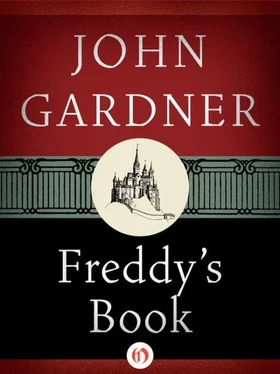He was so deep in thought that he at first hardly noticed when one sailor, then another — darting white shadows in the general whiteness — began to shout and point to starboard. As more and more of them came out on deck, some of them pushing roughly past him where he stood, unable to distinguish him from less important white shadows, Bishop Brask rose sufficiently from his half-dream to realize that something was afoot. He moved toward the rail where the others were, and at last he saw what the shouting was about. A great fleet of rowboats was coming toward them, making its tortuous way through the breaks between ice-sheets.
“It’s Norby and his pirates!” someone shouted, seizing the bishop’s arm. “We’re rescued!”
Baffled, Bishop Brask stared hard in the direction in which the man at his side was pointing. He understood only now — and even now without particular emotion — that they had in fact been in serious danger. It was obvious of course, once one bothered to think about it. The huge, clumsy ship was ice-locked. It hadn’t moved all day.
All around him sailors and passengers were shouting, “God bless Sören Norby!”
Considering the conditions, the boats were approaching with remarkable speed, he saw now. When they reached the ice in which the ship was wedged, Norby’s men climbed out of their rowboats and came precariously on foot. Sören Norby was at the head of the party, shouting and waving, grinning like a fool. The ship’s captain ordered ropes thrown over the side, and in no time Norby’s pirates were aboard the ship, holding out fur-mittened hands to the fur-mittened hands of the sailors and passengers, joking in loud voices, and at last helping the ship’s people down onto the ice and guiding them over to the rowboats that would take them to shore. The snow fell still more heavily. Bishop Brask could no longer see even the rowboats, much less Godand. Two pirates helped him down to the ice, careful and respectful young men of maybe twenty. Holding him by the armpits, they led him in, he hoped, the right direction, all three of them taking small steps, shielding their eyes against the light.
How they reached the rowboat Bishop Brask was unable to remember later; all his mind retained was the cold and the whiteness and the blur of fur-wrapped oarsmen as white as the rest. A kind of thudding broke through his gloomy thoughts, a thudding different from that which had risen from the sides of the rowboat as it labored through the ice, and looking up he was dimly aware of pilings and a dock, mittened hands reaching down to him, and high above the shadows of people the shadows of towers, walls, and trees, the white-masked face of Visby.
Then he was seated in the great roaring hall of Sören Norby, every wall piled high with plunder, not treasure-chests and ingots but bedsteads, ornamental chairs, fine tables, sacks of grain, machinery, bundles of clothes, iron weapons, great cylinders of rope. Such was the booty Norby’s pirates had taken from the ships of the Dutch and Germans, Poles and Russians.
“Magnificent, hey?” a voice boomed in his ear.
When the bishop turned, half in a daze, glancing first at the hand on his shoulder, then up at the face, he saw that the man who’d addressed him was none other than Norby. He’d thrown off his coat and stood, wide-shouldered and jubilant, in a short-sleeved burgher’s shirt, grinning like a boy. Bishop Brask smiled faintly. “Magnificent, yes,” he said.
“Come,” said the pirate, “first a bit of food and wine, then talk.’” He lowered his hand to the bishop’s elbow, as if he thought him a feeble old woman, and helped him to his feet. “I have with me other friends from Sweden,” he said, “gentlemen with whom you’re acquainted, I think.” He led the bishop into a high, narrow corridor and down it to a smaller chamber where in the fireplace flames licked eagerly at a great stack of logs. Three men were waiting there, two in humble monks’ garb, though they did not carry themselves like monks, and a third man the bishop knew at once that he’d seen somewhere before, perhaps often, though at first he couldn’t place him. This third man stood staring out the window, dressed in fine clothes and a long, dark blue cape. None of them turned as Sören Norby led Brask to a chair and brought him wine. When the man in the cape finally did turn, he did so with the cool, mechanical elegance of a figure in a masque — the figure of Death, perhaps, or the Devil in one of his more flattering representations.
“Berend von Melen!” Bishop Brask exclaimed, then instantly calmed himself, for it was a matter of policy with him that he never show interest or surprise. Though he had indeed been considerably surprised — not at von Melen’s duplicity, of course, but at the speed with which Norby had arranged all this — Bishop Brask was sure that he’d shown very little, no more than what they’d surely interpret as a flicker of interest.
“Bishop Brask,” said von Melen, and slightly bowed. Now Hans Brask recognized the two dressed as monks — two of the most important members of the party of Sture, Bishop Peder Jakobssen Sunnanväder and Master Knute Mickilsson, both of them passed over, like Brask himself, when Gustav had chosen his ministers. They all shook hands.
Sören Norby was beaming. “Poor Gustav!” he said.
Beware of underestimating Gustav, thought the bishop, but he merely let out a little smile and said nothing. Sunnanväder and Mickilsson were careful not even to smile.
Sören Norby closed the doors to the room, and the talk began. Bishop Brask registered it without interest. All conspiracies were curiously similar, he’d observed long since. Always a few foxes, always a few geese. Now Norby was in the role played once by young Gustav — the man of feeling, radiant with self-confidence and unthinking love of justice. He was a handsome young man, far more handsome than Gustav, with a better sense of humor (insofar as the young can ever have a true sense of humor, he thought), and a far more ingratiating smile. At the biceps his arms were as thick as a normal man’s thighs. Muscle-bound. Not a good quality in a sword fight. But Norby was no duke, no aristocratic duelist, but a pistol man, knife fighter, boxer. He would do.
The plot was uninteresting, though serviceable. Von Melen would come and pretend to attack Visby, put on a fine show but in the end see Sweden’s navy to the bottom of the sea. Sunnanväder and Mickilsson would strike at Gustav from within, from their base in Dalarna, with armies and leaflets. Ah, always leaflets! thought the bishop. The world would never again be the same, now that leaflets had been invented, and firing them off had been refined to a science as precise as the firing of cannonballs. “Poor Gustav,” as Sören Norby called him, had invented the weapon that would sooner or later be the death of him — no doubt also the death of distinguished prose. It was ironic; if he could work himself up to it, the bishop would even call it sad. Gustav, like the Lutherans, had thought leaflets the weaponry of Truth and noble sentiment. So Sören Norby seemed to think them, too. None of the bishops disabused him.
Very well, very well. Bishop Brask sipped his wine, then sat toying with it, watching how it caught the light, breaking it to pieces. Kristina would be released — Fredrik had as much as given Norby his word — and of course it stood to reason. Norby would be regent of Sweden until Nils reached majority, when Nils would become regent, and thus the Union of Kalmar would rise out of Södermalm’s ashes, with Denmark at its head, as in former times. To clinch the arrangement, and safeguard Nils’ position, Kristina and Norby would marry — a state both of them desired, Brask knew. He’d lived long enough to recognize a man in love when he saw one, not that it made his old heart leap. That Kristina should not feel the same was unthinkable. As flies beget flies, love begets love — the thought had no particular disrespect in it, nor did it enter Brask’s mind as an expression of distaste. All of us live on illusion, so long as we can afford it. Hans Brask, in his youth, had been an avid reader of poetry, and not a casual, indiscriminate reader. He knew the difference between Dante and Petrarch, the Song of Roland and some foolish French tale. He had wept, in his youth, at the story of the saintly Jewess Teresa of Avila; he might weep again now if he had time for books. “Faith,” he’d once written, “is creating what we cannot see.” It had a fine ring to it, and in Latin an excellent pun. But faith was for a man in his study, a dreamer, or for a man who had no other options, such as a farmer planting seeds.
Читать дальше











